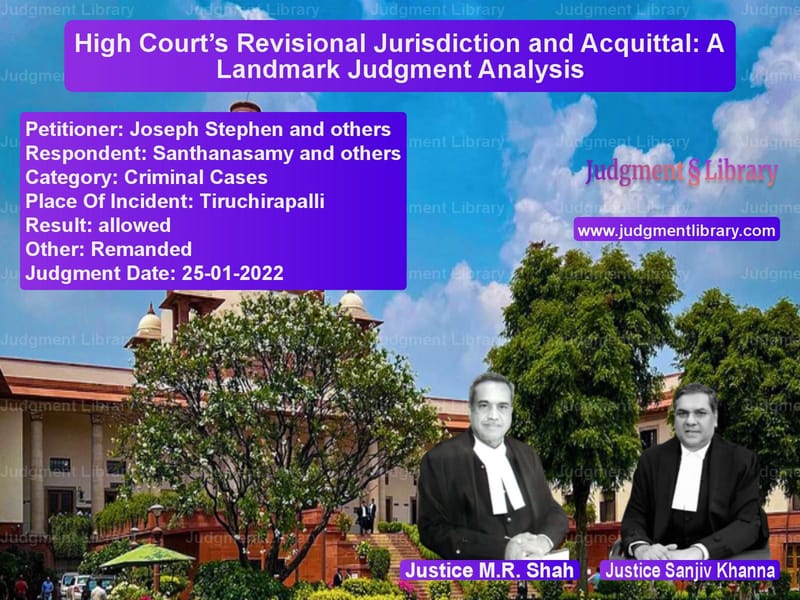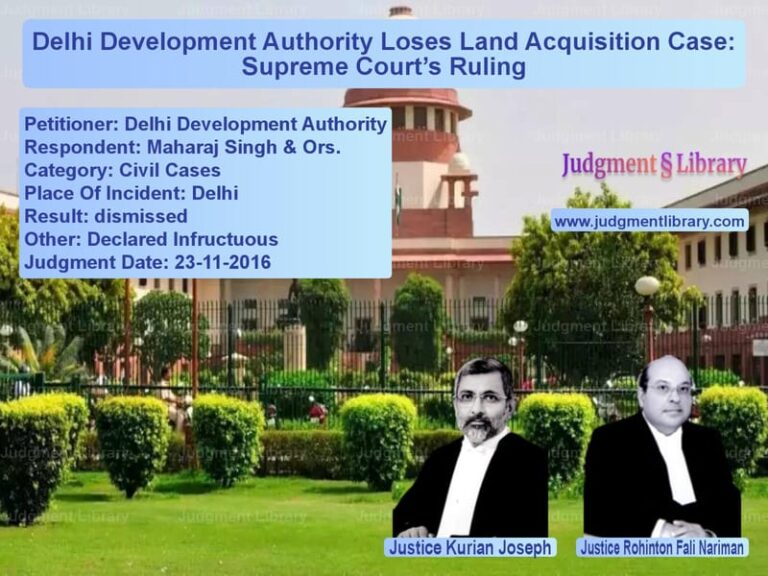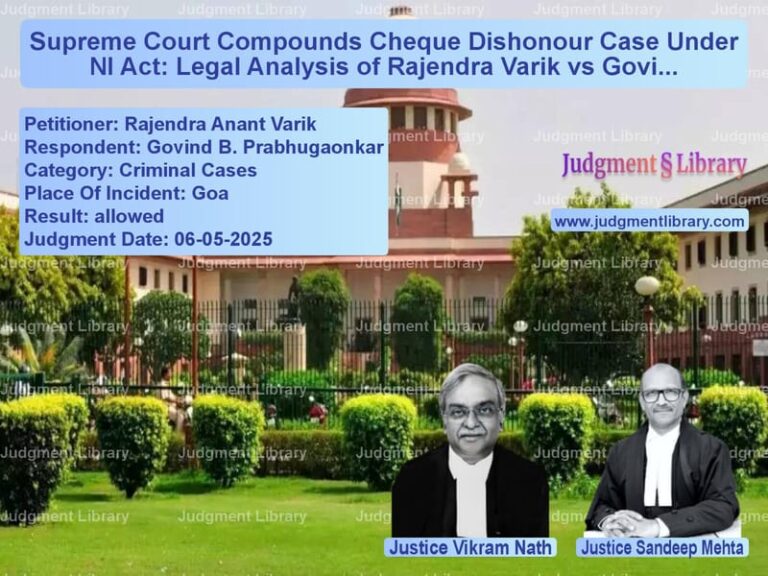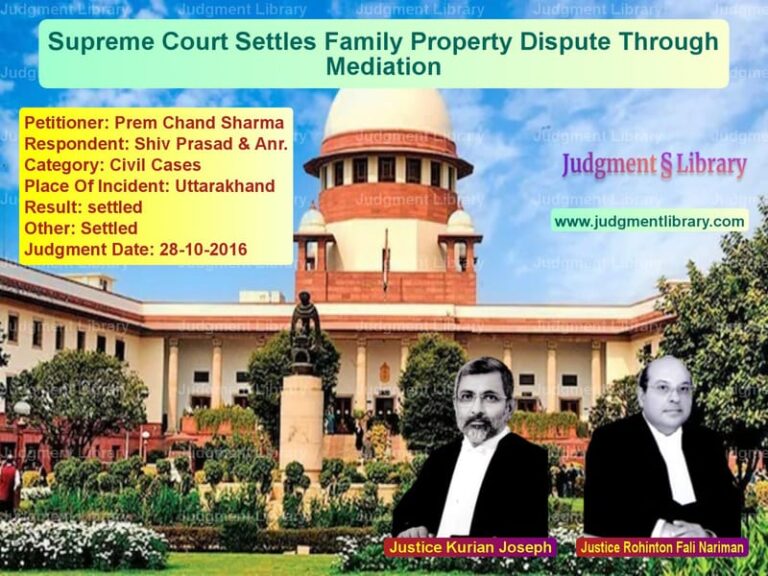High Court’s Revisional Jurisdiction and Acquittal: A Landmark Judgment Analysis
The case of Joseph Stephen and others vs. Santhanasamy and others presented a crucial legal question regarding the scope of revisional jurisdiction under Section 401 of the Criminal Procedure Code (Cr.P.C.). This case involved an appeal against the High Court’s decision, which set aside an acquittal and convicted the accused while exercising its revisional powers.
The case originated from an incident where multiple accused were charged under various sections of the Indian Penal Code (IPC), including Sections 147, 148, 324, 326, 307, and 506(ii) read with Section 149. Initially, the Chief Judicial Magistrate of Tiruchirapalli convicted the accused under some sections while acquitting them under Sections 307 and 506(ii) IPC. However, upon appeal, the first appellate court acquitted the accused of all charges. Subsequently, the victims filed a criminal revision application before the High Court, which overturned the appellate court’s acquittal and reinstated the trial court’s conviction.
Arguments of the Petitioner
Shri S. Nagamuthu, learned Senior Advocate for the accused, strongly argued that the High Court acted beyond its jurisdiction. He relied on Section 401(3) Cr.P.C., which explicitly prohibits the conversion of an acquittal into a conviction under revisional jurisdiction. He submitted:
“While exercising the revisional jurisdiction under Section 401 Cr.P.C., the High Court has no jurisdiction at all to convert a finding of acquittal into one of conviction.”
He further referred to precedents, including K. Chinnaswamy Reddy v. State of Andhra Pradesh and Ganesha v. Sharanappa, which emphasize that the High Court’s revisional power is limited to ordering a retrial or sending the case back for re-examination rather than directly convicting the accused.
Arguments of the Respondent
Shri (Dr.) Joseph Aristotle, representing the respondent-State, conceded that the High Court should not have directly converted the acquittal into a conviction. However, he contended:
“The High Court could have treated the revision application as an appeal under sub-section (5) of Section 401 Cr.P.C. or remanded the matter for rehearing.”
He pointed out that under the amended Section 372 Cr.P.C., the victims had a statutory right to appeal the acquittal, which should have been exercised instead of filing a revision petition.
Supreme Court’s Observations
The Supreme Court, led by Justices M.R. Shah and Sanjiv Khanna, considered three key legal questions:
- Can the High Court, under Section 401 Cr.P.C., overturn an acquittal and convict the accused?
- If a victim has a statutory right to appeal, should a revision application be entertained instead?
- Does the High Court need to pass a judicial order before treating a revision as an appeal?
The Court reaffirmed the established position that:
“Section 401(3) Cr.P.C. bars the High Court from converting a finding of acquittal into one of conviction.”
The proper course, as outlined in K. Chinnaswamy Reddy, is to order a retrial or send the case back to the first appellate court. The Court also clarified that when an appeal is available, a revision should not be entertained, as mandated by Section 401(4) Cr.P.C.
Read also: https://judgmentlibrary.com/supreme-court-cancels-bail-in-rajasthan-murder-case-upholds-rule-of-law/
Final Judgment
The Supreme Court quashed the High Court’s order convicting the accused and remanded the matter to the High Court, directing it to treat the revision applications as appeals under Section 372 Cr.P.C. and decide accordingly.
“The matters are remitted to the High Court. The High Court is directed to treat the revision applications as appeals under Section 372 Cr.P.C. and thereafter to decide and dispose of the same in accordance with law.”
This judgment reinforces the legal principle that revisional jurisdiction cannot be used to bypass the appellate procedure, ensuring procedural fairness and judicial discipline.
Petitioner Name: Joseph Stephen and others.Respondent Name: Santhanasamy and others.Judgment By: Justice M.R. Shah, Justice Sanjiv Khanna.Place Of Incident: Tiruchirapalli.Judgment Date: 25-01-2022.
Don’t miss out on the full details! Download the complete judgment in PDF format below and gain valuable insights instantly!
Download Judgment: joseph-stephen-and-o-vs-santhanasamy-and-oth-supreme-court-of-india-judgment-dated-25-01-2022.pdf
Directly Download Judgment: Directly download this Judgment
See all petitions in Bail and Anticipatory Bail
See all petitions in Fraud and Forgery
See all petitions in Attempt to Murder Cases
See all petitions in Judgment by Mukeshkumar Rasikbhai Shah
See all petitions in Judgment by Sanjiv Khanna
See all petitions in allowed
See all petitions in Remanded
See all petitions in supreme court of India judgments January 2022
See all petitions in 2022 judgments
See all posts in Criminal Cases Category
See all allowed petitions in Criminal Cases Category
See all Dismissed petitions in Criminal Cases Category
See all partially allowed petitions in Criminal Cases Category







